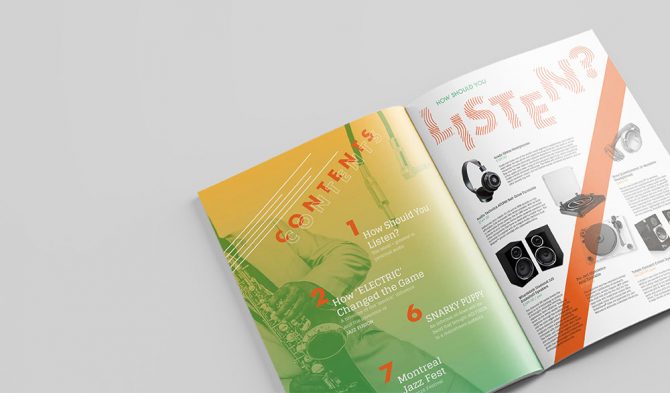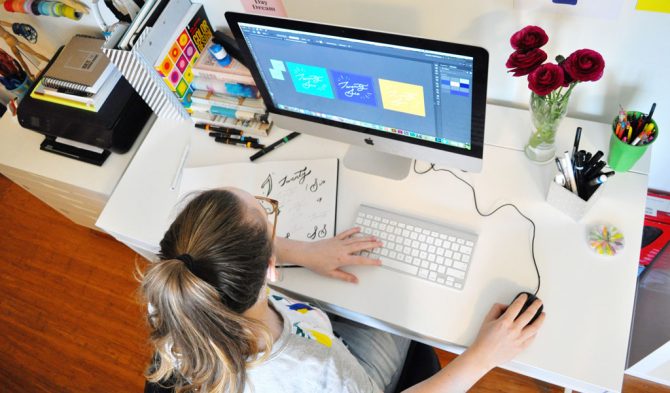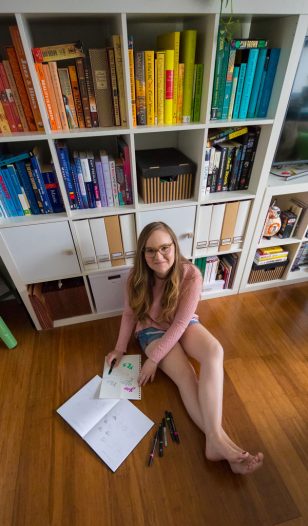Making the World Do a Double Take with Graphic Design | Emma Steele’s Toronto Film School Story
Emma Steele, the 2018 valedictorian for the Graphic Design and Interactive media program, is passionate about graphic design and visual communication. Here she shares a bit about her passion, what brought her to Toronto Film School and her plans for the future.
What brought you to Toronto Film School?
When I found the Toronto Film School through a friend of a friend, I was looking for a program that would help me make a tangible shift from fine art to design. However, having already completed a 4-year-long Bachelor’s Degree at a University, I was looking for a different experience – preferably a shorter and smaller program. TFS checked every box and ended up being exactly what I needed to start my career.

Why did you choose the Graphic Design and Interactive Media Diploma at Toronto Film School?
I chose the Graphic Design program specifically because of the way it was structured. It touched on every aspect of design that interested me and was designed to make you work-force ready – something I hadn’t experience in my Undergraduate studies. I was particularly drawn to the Capstone class that acted as both a Thesis and a Field Placement.
Before starting at Toronto Film School was there anything that was holding you back from pursuing your passion? If so how did you overcome that fear?
I had a big problem with imposter syndrome before starting at TFS. When I started freelancing as an illustrator,I felt like I didn’t quite belong in the art world or the design world – that I was somehow insufficient at both. But once I decided to pull the trigger and get more education, the fear fell away and I felt more passionate and confident about what I was doing.

What is the biggest change you have seen in yourself over the course of your time at Toronto Film School?
Apart from all the new software I learned (which was a lot) and the drastic improvement in my design skills, I feel more confident in my creative decision making, and more secure voicing my opinions and ideas out loud.
What is one of the most important things you have learned/experienced at TFS?
I think the most important thing I learned was how to make intentional and rational design choices, and to trust the audience you’re communicating to. This is a really useful mantra because it gives me a great combination of parameters and freedom when I work. And the most important thing I experienced was studying alongside all my incredible classmates who had completely different design sensibilities and points of view than me. I was reminded every day that there is always more than one way to approach a creative problem.

What kept you motivated in your studies?
Honestly, the speed of this program was always what kept me motivated. Not just because I could see the light at the end of the tunnel, but also because you didn’t really have time to stop and think and take stock of all you had to do! It was so quick that you just had to keep your head down and continue working.
What are your plans after graduation both immediate and long-term?
I am currently doing in-house graphics at an architecture firm in Toronto to pay the bills, but I am also actively taking on freelance work that I’m passionate about and that fulfills me creatively. My hope is that one day I’ll be able to create a fulltime business from this freelance work, and be able to work for myself!

What made Toronto Film School and your experience here special?
I think many of the teachers are what really made this experience so special. They were as effective as they were enthusiastic. Their passion for their craft was infectious, and there was rarely a day where that I didn’t feel pushed to be my best and most creative self.
If you offered one piece of advice to an incoming student, what would that be?
I think I would say 1) Don’t be afraid to make mistakes, and trust the process. The more work you do and mistake you make, the more you will continue to improve; 2) Keep your eyes open because inspiration can come from literally anywhere; and 3) Make sure that above all things, you like the work that you’re doing. Because usually if you don’t like it, people can tell, and they won’t like it either.


